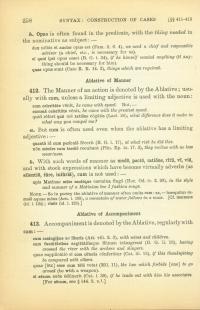412. The manner of an action is denoted by the ablative; usually with cum, unless a limiting adjective is used with the noun.
Cum celeritāte vēnit.
He came with speed.
BUT
Summā celeritāte vēnit.
He came with the greatest speed.
Quid rēfert quā mē ratiōne cōgātis? (Lael. 26)
What difference does it make in what way you compel me?
a. But cum is often used even when the ablative has a limiting adjective.
quantō id cum perīculō fēcerit (B. G. 1.17)
at what risk he did this
Nōn minōre cum taediō recubant.(Plin. Ep. 9.17.3)
They recline with no less weariness.
b. With such words of manner as modō, pactō, ratiōne, rītū, vī, viā, and with stock expressions which have become virtually adverbs (as silentiō, iūre, iniūriā), cum
Apis Matīnae mōre modōque carmina fingō.
(Hor. Od. 4.2.28)
In the style and manner of a Matinian bee I fashion songs.
Note— So in poetry the Ablative of Manner often omits cum
Īnsequitur cumulō aquae mōns. (Aen. 1.105)
a mountain of water follows in a mass.
cf. murmure (id. 1.124); rīmīs (id. 1.123)

